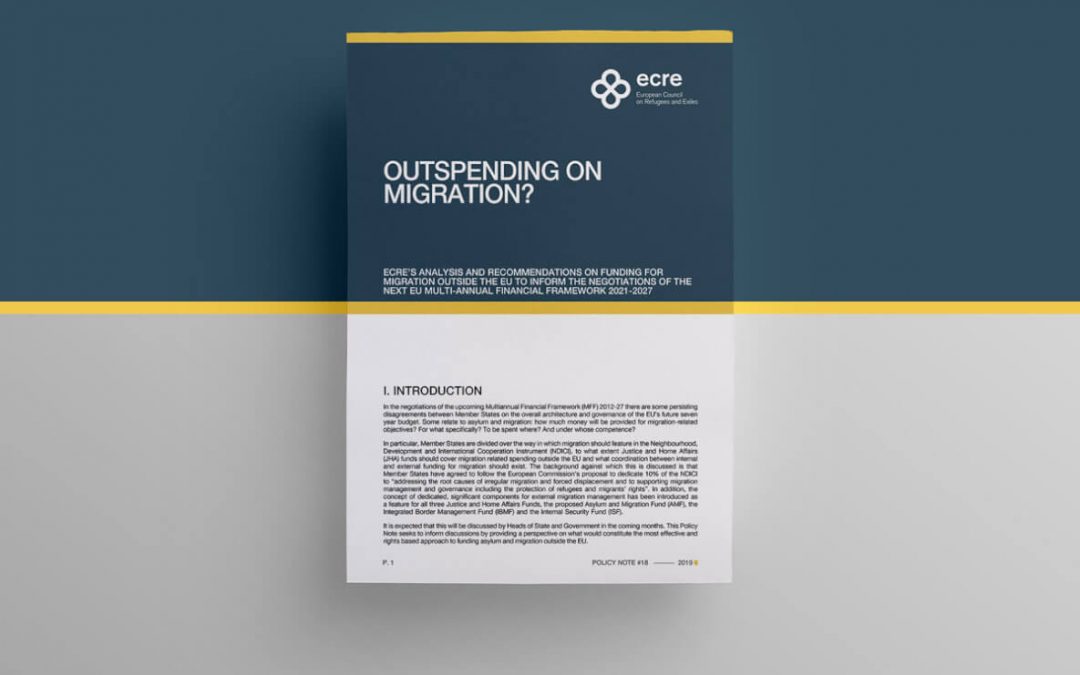ECRE published a Policy Note which focuses on issues related to asylum and migration in the ongoing negotiations for the EU’s next long-term budget: how much money will be provided for migration-related objectives? For what specifically? To be spent where? And under whose competence?
As part of the negotiations for the next Multi-Annual Financial Framework (MFF), Member States are divided over the way in which migration should feature in the Neighbourhood, Development and International Cooperation Instrument (NDICI), to what extent Justice and Home Affairs (JHA) funds should cover migration related spending outside the EU and what coordination between internal and external funding for migration should exist. The Policy Note seeks to inform discussions by providing a perspective on what would constitute the most effective and rights based approach to funding asylum and migration outside the EU.
It argues that it is the immense need resulting from forced displacement, with least developed countries hosting one third of the world’s asylum seekers and 85% of the world’s refugees living in the developing world which should be the priority of migration related EU development assistance. If Member States make a more specific reference to migration management, this should be based on the Global Compact for Safe, Regular and Orderly Migration (GCM) and the Sustainable Development Goals, more particularly SDG 10.7 which is to “facilitate orderly, safe, and responsible migration and mobility of people, including through implementation of planned and well-managed migration policies”. The suggested 10% earmarking for migration will already lead to the allocation of a significant amount of the EU’s development budget to issues related to displacement and migration. It should therefore be an indicative maximum earmark.
The current MFF proposal already introduces enough flexibility, so no additional measures to increase flexibility within NDICI should be taken. The proposed emerging challenges and priority cushion, which constitutes 11% of NDICI is flexible enough to also be used to address migration if a change in dynamics would risk leading to instability, conflict or undermine resilience of states. However, in line with the Busan Commitments, this should be based on the third countries assessment of priorities as opposed to the EU’s. Member States who are committed to effective and flexible EU external action should commit to defending the EU’s external and development budget, which in past MFF negotiation received the largest cuts proportionally to the initial proposal by the European Commission.
The MFF proposal foresees a significant increase in the amount of money dedicated to migration and border management as part of the Justice and Home Affairs funds. With adequate resources, the Asylum and Migration Fund (AMF) can play a considerable role in ensuring fair and effective asylum systems in Europe, returns in dignity of third country nationals and contribute to the harmonisation of standards in relation to asylum, reception conditions and integration. It is therefore that support to the third countries under the AMF and the suggested, significant components for external migration management must remain limited and inherently linked to the internal dimension of the Common European Asylum System (CEAS). Diverting a substantial portion of the funds outside the EU can be used as a justification for continued substandard asylum systems and poor integration services. The same argument holds true when considering the spending of the Integrated Border Management Fund (IBMF) outside the EU. The link with the objective of the fund to ensure “strong and effective European integrated border management at the external borders while safeguarding the free movement of persons within it” must be made clear for all activities outside the EU.
In line with the European Parliament, ECRE proposes the introduction of a maximum allocation requirement of 5% of AMF and 4% of IBMF for funding spent outside the EU. Without a cap, there is a risk that JHA funds will be diverted outside of Europe which will jeopardise the EU and Member States reaching the CEAS and integrated border management objectives. In addition, increased JHA spending outside may result in a parallel foreign policy developed, implemented and managed by DG Home and Ministries of Interior.
It must be ensured that each of the actions in or in relation to a third country fully respects the rights and principles enshrined in the Charter of Fundamental Rights of the European Union, and the international obligations of the Union and the Member States. The EU otherwise runs the risk of becoming complicit in human rights violations. Oversight of border control activities to assess their compliance with international refugee and human rights law, commonly known as border monitoring, is a fundamental component of rights-compliant migration management systems. Ensuring civil society has access to IBMF funding and is supported to participate in border monitoring programmes is therefore important.
The Policy Note also makes the argument for amending the weighting of indicators which determine how much money is being allocated to national programmes and including both a quantitative and a qualitative analysis of Member States performance under the AMF and IBMF in the mid-term review which determines the allocation of the second tranche of spending to Member States.
For further information:
- ECRE, Policy Note: The Price of Rights: Asylum and EU Internal Funding, May 2018
- ECRE, Policy Note: The Price of Rights: Asylum and EU External Funding, May 2018
- ECRE, Comments on the European Commission Proposal on the Asylum and Migration Fund, September 2018
This article appeared in the ECRE Weekly Bulletin . You can subscribe to the Weekly Bulletin here.

